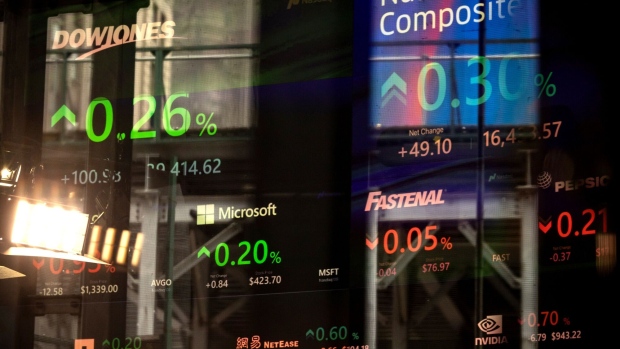Apr 26, 2024
Markets today: 'AI craze' powers best week in 2024 for stocks
, Bloomberg News

A rally in the world’s largest technology companies lifted stocks, with Wall Street also breathing a sigh of relief after the latest inflation data came roughly in line with estimates.
Equities notched their best week in 2024 after Microsoft Corp. and Google’s parent Alphabet Inc. sent a clear message to investors: Our spending on artificial intelligence and cloud computing is paying off. That came as a positive signal for many traders wondering whether the main engine of the bull market would be able to live up to the high bar set for the industry.
The latest results from large technology companies have reinforced the group’s strong fundamentals, helping offset worries about the macroeconomic backdrop, according to Solita Marcelli at UBS Global Wealth Management.
“With tech fundamentals staying robust, in particular from big tech in the first quarter, we continue to highlight the recent correction has provided interesting entry points for tech and AI-related stocks,” Marcelli said.
The S&P 500 closed around 5,100, while the tech-heavy Nasdaq 100 climbed almost 2 per cent. The yield on 10-year Treasuries declined four basis points to 4.67 per cent. The dolar rose.
To Clark Bellin at Bellwether Wealth, Friday’s inflation report keeps rate cuts on the table for 2024, but more likely towards the end of the year.
“We believe the stock market can power through these elevated interest rates, as earnings are still fairly strong and companies are figuring out how to still thrive in this high interest rate environment,” he noted.
Bellin says investors should continue to be on the lookout for opportunities in the market and consider taking advantage of the recent pullback, where “many quality stocks went on sale.”
“Every new inflation print has elevated importance, and the market was in need of an ‘in-line’ print to confirm that the Fed wasn’t starting to lose this battle,” said John Kerschner at Janus Henderson Investors. “Although inflation is still too high for the Fed’s comfort, if progress does continue, it still may be reasonable to assume one, maybe two, cuts in 2024.”
The U.S. equity market will continue to rely on a handful of megacaps stocks for direction until an uptick in real interest rates ignites recession fears, according to Bank of America Corp. strategists led by Michael Hartnett.
That concentration will remain intact until real 10-year yields — rates adjusted to reflect the true cost of funds — rise to around 3 per cent, “or higher yields combine with higher credit spreads to threaten recession,” they wrote.
Elevated bond yields adjusted for inflation, seen as a proxy for tight financial conditions, are a common way for stock-market bubbles to burst.
Corporate Highlights:
- Intel Corp., the biggest maker of personal computer processors, gave a lackluster forecast for the current period, indicating that it’s still struggling to return to the top tier of the chip industry.
- Snap Inc. offered positive signs that its efforts to revamp its digital advertising business are gaining popularity with marketers — boosting revenue and providing stronger competition with powerhouses Google and Meta Platforms Inc.
- Exxon Mobil Corp. and Chevron Corp. declined after disappointing first-quarter performances.
- AbbVie Inc. lifted its full-year profit guidance as newer anti-inflammatory treatments like Rinvoq and Skyrizi take over for Humira, the blockbuster arthritis drug that fueled the company’s growth for more than 15 years.
Some of the main moves in markets:
Stocks
- The S&P 500 rose 1 per cent as of 4 p.m. New York time
- The Nasdaq 100 rose 1.7 per cent
- The Dow Jones Industrial Average rose 0.4 per cent
- The MSCI World index rose 0.9 per cent
Currencies
- The Bloomberg Dollar Spot Index rose 0.2 per cent
- The euro fell 0.3 per cent to US$1.0700
- The British pound fell 0.1 per cent to $1.2498
- The Japanese yen fell 1.4 per cent to 157.90 per dollar
Cryptocurrencies
- Bitcoin fell 1.6 per cent to $63,767.27
- Ether fell 1.2 per cent to $3,135.52
Bonds
- The yield on 10-year Treasuries declined four basis points to 4.67 per cent
- Germany’s 10-year yield declined six basis points to 2.57 per cent
- Britain’s 10-year yield declined four basis points to 4.32 per cent
Commodities
- West Texas Intermediate crude was little changed
- Spot gold rose 0.3 per cent to $2,339.99 an ounce






